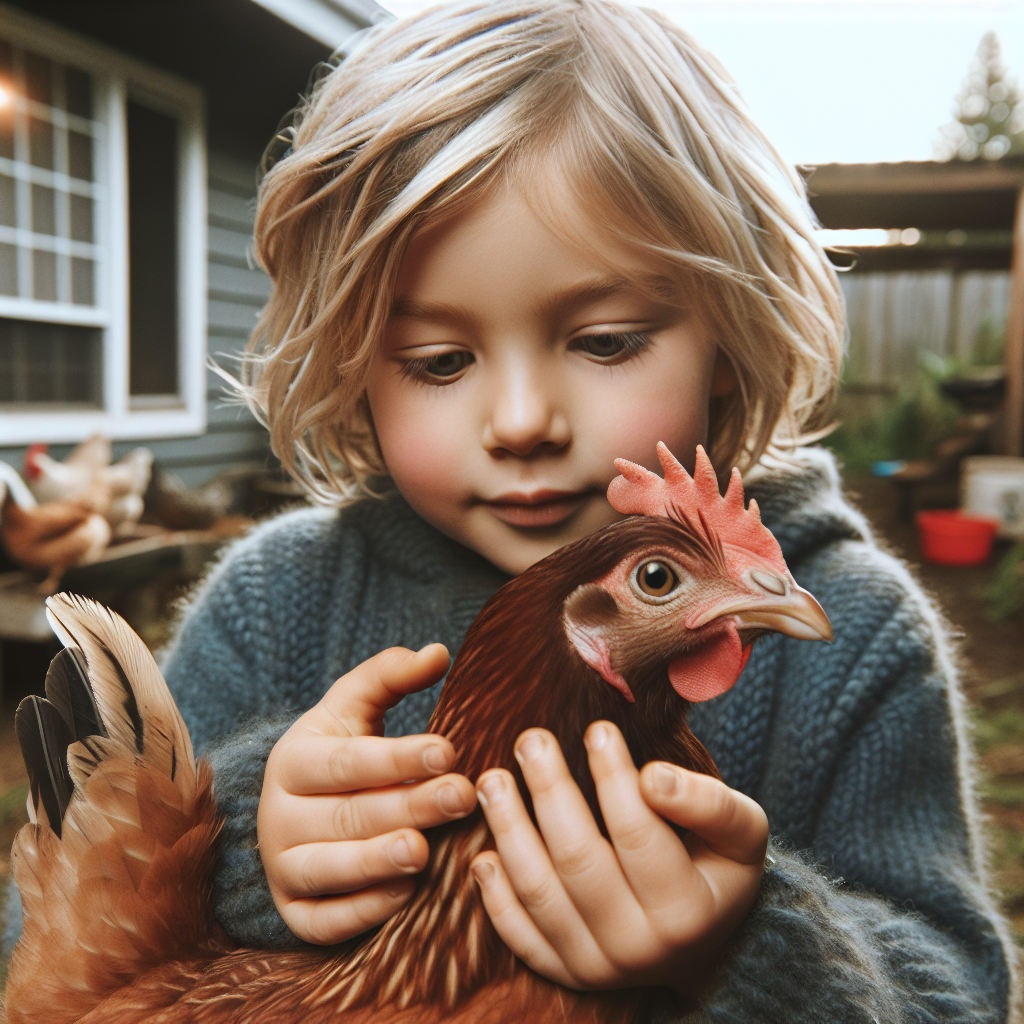You’ve always dreamed of having a little flock of chickens in your backyard. The thought of fresh eggs each morning and the soothing clucks of your feathery companions has finally convinced you to take the plunge. But before you start picking out the perfect chicken coop, there are a few important considerations to keep in mind. From understanding local regulations to creating a safe and comfortable space for your feathered friends, this article will guide you through the key factors to consider when breeding chickens in a backyard environment. So grab a cup of coffee and get ready to embark on your new adventure as a backyard chicken owner!
Selecting Chicken Breeds
Breeding chickens in a backyard environment requires careful consideration and planning. Before embarking on this rewarding endeavor, there are a few key factors to keep in mind. First and foremost, you need to determine the purpose of breeding. Are you looking to raise chickens for eggs, meat, or simply as pets? Different breeds have different characteristics and excel in specific areas, so it’s important to select the right breeds based on your goals.
Consider the Purpose of Breeding
If you’re primarily interested in egg production, breeds such as the Rhode Island Red or Leghorn are excellent choices. These breeds are known for their exceptional egg-laying capabilities and reliable performance. On the other hand, if your main goal is to raise chickens for meat, breeds like the Cornish Cross or the Sussex are ideal. These breeds tend to have a faster growth rate and robust body conformation, making them well-suited for meat production.
Should you just want chickens for companionship, a breed known for its friendly temperament, such as the Orpington or the Australorp, would be a great option. These breeds are not only sociable but also known to be good with children, making them perfect for families looking for feathered friends.
Evaluate Breeds Suitable for Backyard Environment
Once you have determined the purpose of breeding, the next step is to evaluate the breeds that are best suited for a backyard environment. When choosing chicken breeds for a backyard setting, it’s important to consider factors such as noise level, adaptability to confinement, and tolerance for a limited space.
Certain breeds, like the Silkie or Bantam breeds, are known for being relatively quiet and can be a great choice if you live in a neighborhood with noise regulations. These breeds tend to have a more gentle and laid-back temperament, making them less likely to be disruptive to your neighbors.
Additionally, some breeds adapt better to a confined space, making them ideal for backyard environments. Breeds such as the Plymouth Rock or the Wyandotte are well-known for their ability to thrive in smaller living spaces while still maintaining their health and productivity.
Assess Breeds’ Temperament and Climate Adaptability
The temperament of your chickens is an essential aspect to consider when breeding in a backyard environment. Friendly, docile breeds are generally more suitable, especially if you have small children or frequently host visitors. Calm chickens are not only easier to handle, but they also minimize the risk of any aggressive behavior towards you or others.
Furthermore, it’s crucial to select chicken breeds that are well-suited to your climate. Some chickens are naturally more robust and adaptable to varying weather conditions, while others may require extra care and protection during extreme temperatures. Research breeds that are known for their climate adaptability in your specific region to ensure the health and well-being of your flock.
Housing and Space Requirements
Once you have selected the appropriate chicken breeds, providing them with suitable housing and sufficient space is vital for their overall well-being and productivity.
Provide Adequate Shelter
Chickens need a safe and secure shelter to protect them from inclement weather, predators, and disease. A sturdy coop that is well-insulated and ventilated will help maintain proper temperature and prevent excessive moisture buildup. The coop should provide enough space for your chickens to roost, as well as nesting boxes for laying eggs. Additionally, make sure the coop has secure doors and windows to keep predators out.
Ensure Sufficient Space for Chickens
It’s essential to provide enough space for your chickens to roam and exhibit natural behaviors. The general rule of thumb is to allow at least 4 square feet of outdoor space per chicken. This allows them to forage, dust bathe, and explore their surroundings comfortably. However, keep in mind that different breeds have different space requirements, so be sure to do your research and provide adequate space accordingly.
Consider Coop Design and Ventilation
When designing your coop, consider factors such as ease of cleaning, accessibility for feeding and watering, and proper ventilation. It’s important to regularly clean the coop to prevent the buildup of bacteria and parasites that can negatively impact your chickens’ health. Proper ventilation, on the other hand, helps maintain air quality and regulates temperature, ensuring your chickens are comfortable year-round.
Feeding and Nutrition
Proper nutrition plays a crucial role in the health, growth, and productivity of your chickens. To ensure their well-being, it is essential to provide a balanced diet, access to fresh water, and appropriate treats as supplements.
Offer a Balanced Diet
A well-balanced diet is essential for healthy chickens. Their diet should consist of a combination of commercial poultry feed and kitchen scraps to provide a diverse range of nutrients. High-quality feed formulated for the specific needs of your chickens’ age and purpose (egg-laying or meat production) will ensure they receive the necessary vitamins, minerals, and protein. Additionally, offering them kitchen scraps, such as vegetable peels or fruits, can help provide variety and additional nutrients.
Provide Access to Fresh Water
Access to clean and fresh water is crucial for the health and hydration of your chickens. Make sure your chickens have constant access to water that is free from contaminants and regularly change and clean their water containers. Insufficient water intake may lead to dehydration and negatively impact egg production and overall health.
Supplement Diet with Appropriate Treats
While a balanced diet is essential, it’s also enjoyable to treat your chickens with occasional treats. Treats like mealworms, fruits, or leafy greens can serve as a valuable source of enrichment and help create a bond between you and your flock. However, it’s important not to overindulge them, as excessive treats can lead to nutritional imbalances and obesity.
Breeding Procedures
When it comes to breeding chickens, there are several important factors to consider, such as the method of reproduction, understanding the reproductive cycle, and deciding between a broody hen or incubation.
Decide on Natural Mating or Artificial Insemination
One of the first decisions to make when breeding chickens is whether you will opt for natural mating or artificial insemination. Natural mating involves having a rooster and allowing the hens and rooster to mate freely. On the other hand, artificial insemination involves manually collecting and introducing semen into the hens.
Natural mating is the most common method used in backyard breeding scenarios, as it allows for natural reproduction and less intervention. However, artificial insemination may be necessary in certain cases, such as when specific genetic traits need to be preserved or improved.
Understand the Reproductive Cycle of Chickens
To successfully breed chickens, it is crucial to have a good understanding of their reproductive cycle. Hens typically begin laying eggs around 5 to 6 months of age and will continue to do so for several years. The reproductive cycle involves a series of hormonal changes, egg development, and nesting behaviors.
Hens have a natural inclination to sit on their eggs and incubate them, known as being “broody.” Understanding how to identify broodiness and provide suitable nesting conditions is important if natural incubation is your preferred method of breeding.
Consider Broody Hen or Incubation
When it comes to hatching eggs, you have the option of letting a broody hen incubate them or using an incubator. A broody hen is a chicken that has the instinct to sit on her eggs and provide the necessary warmth and humidity for them to hatch. Allowing a broody hen to incubate eggs is a natural and hands-off approach, but it does require dedicating a hen to the task for several weeks.
On the other hand, using an incubator gives you full control over the incubation process. It allows you to monitor and regulate temperature and humidity levels to maximize hatch rate. However, it requires more active involvement and careful management to ensure the successful hatching of chicks.
Caring for Chicks
Bringing adorable chicks into the world is an exciting experience, but it also requires careful attention and proper care to ensure their health and well-being.
Provide a Safe and Warm Brooding Area
Chicks need a safe and warm brooding area to thrive during their first few weeks of life. This area should be protected from predators, drafts, and extreme temperatures. A brooder box or brooder lamp can provide the necessary warmth, simulating the warmth a mother hen would provide. Ensure the area is clean, well-ventilated, and spacious enough to accommodate the growing chicks as they develop.
Ensure Proper Hygiene and Cleanliness
Maintaining proper hygiene and cleanliness is crucial for the health of your chicks. Regularly clean their brooding area to remove any droppings, excess feed, or soiled bedding. Replace bedding as needed and provide fresh water multiple times a day. Proper hygiene minimizes the risk of diseases and ensures a healthy start for your chicks.
Monitor Chicks’ Health and Growth
It’s important to closely monitor the health and growth of your chicks. Regularly check their appearance, behavior, and droppings to detect any signs of illness or malnutrition. Watch for symptoms such as lethargy, ruffled feathers, diarrhea, or loss of appetite, as they may indicate underlying health issues. Promptly address any concerns by seeking veterinary advice or adjusting their diet or environment as necessary.
Predator Protection
Protecting your chickens from predators is paramount to their safety and well-being. Implementing effective security measures is essential to ensure a stress-free and secure environment for your flock.
Implement Security Measures to Ward Off Predators
Start by reinforcing the coop and any outdoor enclosures to make them predator-proof. Secure the doors and windows with strong locks or latches, and cover any gaps or openings that may allow access to predators. Use sturdy materials such as hardware cloth or welded wire to prevent predators from digging under or climbing over fences. Regularly inspect the coop for any signs of damage or weakness and promptly address any issues.
Utilize Fencing and Netting Strategies
Adding fencing around your coop and outdoor area can provide an extra layer of protection. Use sturdy fencing materials that predators cannot easily chew or break. Dig the fencing at least a foot into the ground to prevent predators from burrowing underneath. Consider utilizing netting or wire covers over outdoor areas to prevent birds of prey or other aerial predators from swooping down and harming your chickens.
Consider Predator Deterrents
Various predator deterrents can be employed to discourage potential threats. Some common deterrents include motion-activated lights or sound devices, which startle and deter predators. Installing a predator-proof electric fence can also be effective. Additionally, having a well-trained guard dog can provide an added layer of protection, as they are highly effective in deterring predators.
Breeding Record Keeping
Keeping accurate records is crucial for successful breeding. Maintaining detailed records of your breeding stock, breeding outcomes, and any health issues is essential for monitoring the progress and maintaining the health of your flock.
Maintain Accurate Records of Breeding Stock
Keep a comprehensive record of your breeding stock, including their breed, age, origin, and important traits. This will help you track the lineage and genetic traits passed down to future generations. Maintaining accurate records of your stock will also assist in making informed breeding decisions and help you recognize any patterns or trends that emerge over time.
Track Breeding Outcomes and Health Issues
Record the outcomes of each breeding attempt, including the number of eggs laid, fertilization rates, and hatch rates. This valuable information will allow you to assess the success of your breeding program and make any necessary adjustments. Similarly, document any health issues or concerns that arise in your flock. Note symptoms, treatments, and outcomes to help identify any recurring health problems and take appropriate action.
Document Feed and Medication Usage
Keeping a log of your chickens’ feed and medication usage is important for maintaining their health and managing their nutritional needs. Record the type and quantity of feed given, as well as any supplements or medications administered. This information will help you evaluate the effectiveness of your feeding program and ensure you are meeting your chickens’ dietary requirements.
Health Management
Proactive health management is crucial for ensuring the longevity and well-being of your flock. Establishing a relationship with a veterinarian, implementing a vaccination and deworming schedule, and recognizing common health issues are all vital aspects of keeping your chickens healthy.
Establish a Relationship with a Veterinarian
It is highly recommended to establish a relationship with a veterinarian who specializes in poultry health. Regular check-ups and consultations with a poultry veterinarian can help detect any potential health issues and provide appropriate treatment or preventative measures. A veterinarian can also provide guidance on vaccination schedules, nutrition, and general flock management.
Implement Vaccination and Deworming Schedule
Preventing diseases and parasites is critical in maintaining a healthy flock. Implement a vaccination schedule recommended by your veterinarian to protect your chickens against common diseases such as Marek’s disease, Newcastle disease, and infectious bronchitis. Similarly, deworming your birds regularly helps control internal parasites that can negatively impact their health and productivity. Consult your veterinarian for guidance on appropriate vaccination and deworming protocols.
Recognize Common Health Issues and Symptoms
Engaging in regular flock monitoring allows you to become familiar with common health issues and symptoms chickens may experience. Look out for signs such as reduced appetite, changes in droppings, abnormal breathing, or changes in feather appearance. Recognizing these symptoms early on enables prompt intervention and increases the chances of successful treatment. Educate yourself about common chicken ailments and be vigilant in observing your flock’s behavior and overall well-being.
Rooster Considerations
If you choose to have a rooster in your backyard breeding setup, there are additional considerations to keep in mind. Evaluating noise and disturbance regulations, assessing rooster compatibility with the surrounding area, and managing rooster behavior and aggression are key aspects to ensure a harmonious backyard environment.
Evaluate Noise and Disturbance Regulations
Before introducing a rooster to your backyard, familiarize yourself with any local noise and disturbance regulations. Some neighborhoods or municipalities may have restrictions on the number of roosters allowed or specific noise limitations. Ensure you are within these regulations to avoid potential conflicts with neighbors or legal issues.
Assess Rooster Compatibility with Surrounding Area
Consider the layout and characteristics of your surrounding area when deciding to keep a rooster. Evaluate factors such as proximity to neighbors, the density of housing, or the presence of sensitive populations, like schools or nursing homes. Certain breeds are naturally quieter or have been selectively bred for reduced noise levels, which can help minimize disturbance to your surroundings.
Manage Rooster Behavior and Aggression
Roosters can display aggressive behavior, especially during breeding and mating seasons. It’s important to manage their behavior and aggression to ensure the safety of both humans and other chickens. Provide ample space within the coop and outdoor area to prevent overcrowding and minimize the potential for conflicts. If aggression becomes an issue, consider separating roosters or implementing management techniques, such as “timeout pens” or physical barriers, to maintain a peaceful and harmonious flock.
Neighborhood Considerations
When breeding chickens in a backyard environment, it is essential to be considerate of your neighborhood and adhere to local laws and regulations. Ensuring your backyard environment is suitable for chickens and managing noise, odor, and waste disposal are important factors in maintaining positive relationships with your neighbors.
Respect Local Laws and Regulations
Before starting a backyard breeding project, research and familiarize yourself with the local laws and regulations governing the keeping of chickens. Some areas may have specific guidelines regarding the number of chickens allowed, coop placement, noise restrictions, or waste management. It is essential to adhere to these regulations to avoid any potential conflicts or legal consequences.
Ensure the Backyard Environment is Suitable for Chickens
Creating a suitable backyard environment for chickens involves considering factors such as available space, environmental hazards, and potential nuisances. Assess the space you have available and ensure it can accommodate the needs of your flock comfortably. Remove any potential hazards, such as poisonous plants or chemicals, that could jeopardize the health of your chickens. Furthermore, take measures to control odors and waste effectively to minimize any unpleasant odors that may affect your neighbors.
Manage Noise, Odor, and Waste Disposal
While chickens can be relatively quiet, especially compared to other pets, they can still generate some level of noise. To minimize disturbances, strategically place the coop away from neighboring properties or consider sound-dampening solutions. Regularly clean the coop and implement proper waste disposal practices to manage odor effectively. Utilize composting techniques or chicken manure management systems to turn waste into valuable fertilizer, reducing waste and the associated odors.
By considering these various factors and following the best practices for breeding chickens in a backyard environment, you can create a safe, healthy, and enjoyable environment for both your feathered friends and you. Remember that responsible breeding requires ongoing care, attention, and a commitment to providing the best possible care for your chickens. With dedication and proper planning, you can experience the joy of breeding chickens while creating a sustainable and fulfilling experience in your own backyard.




